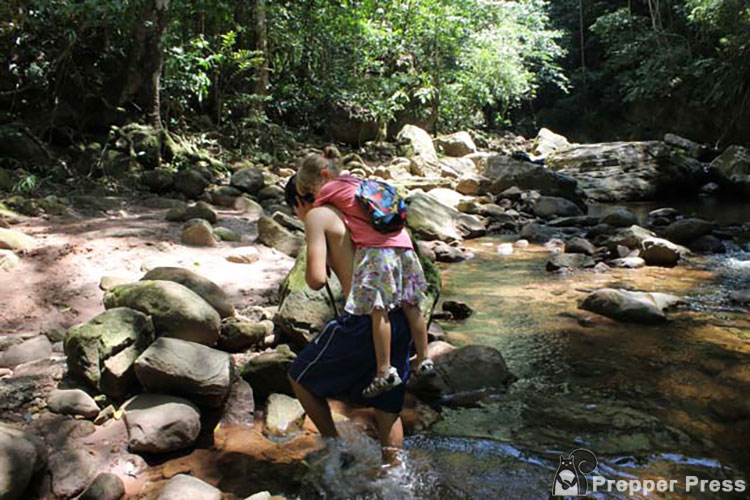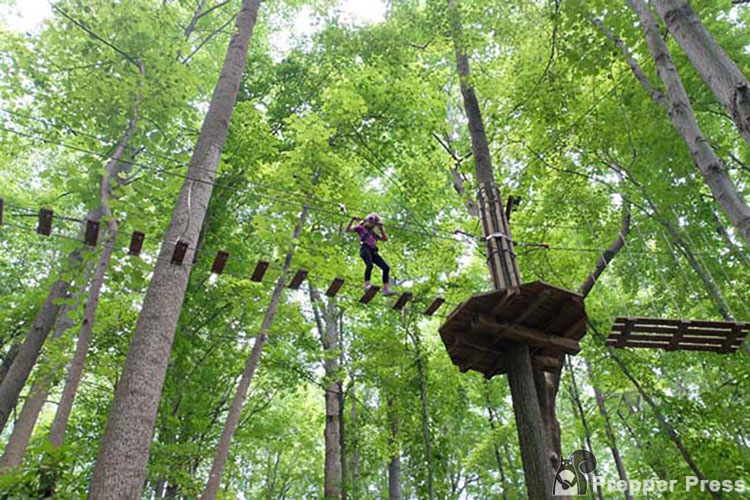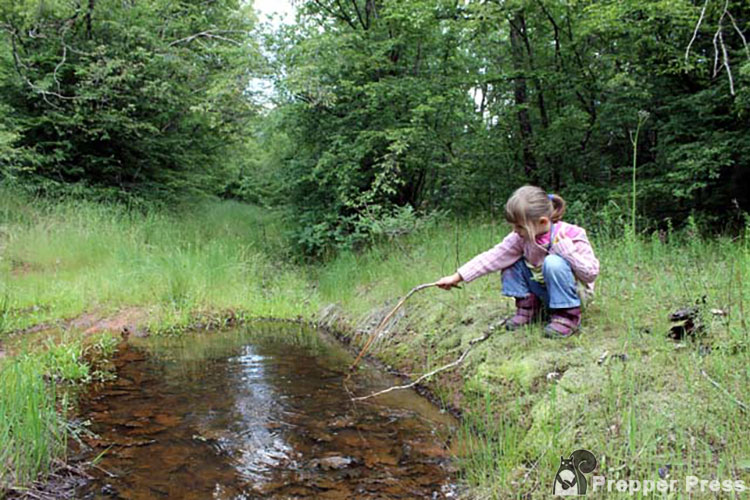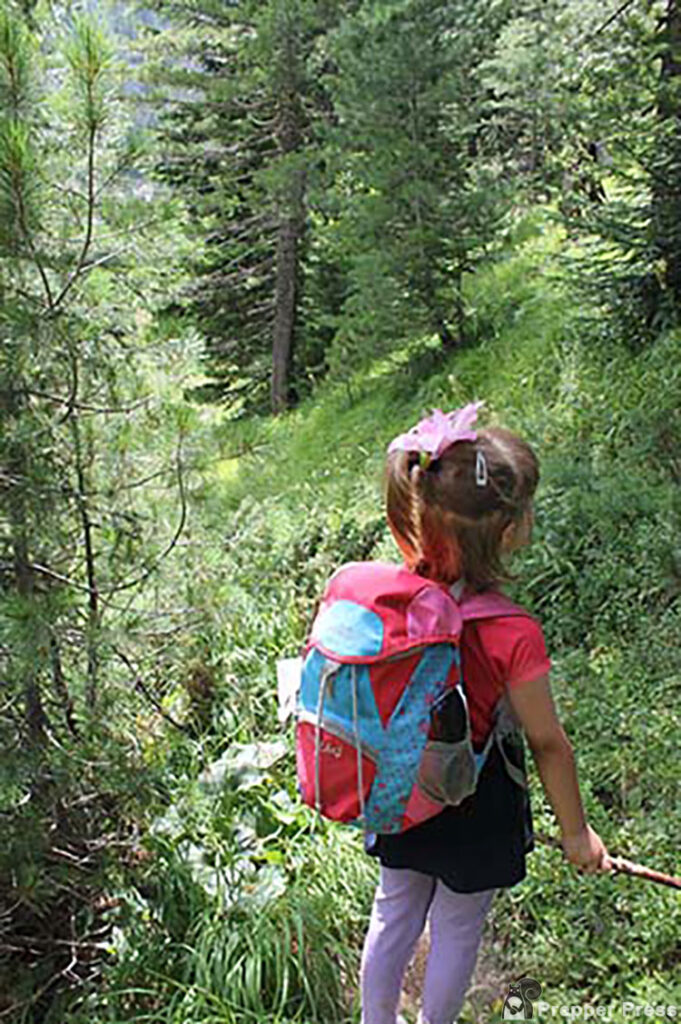This is a guest post written by Diane Vukovic of Mom Goes Camping. She has solid advice on raising tough kids; nine tactics, all of which I try to maintain. They help to raise kids ready for the apocalypse. Ready to be… War Boys!

***********************************************************
Today’s kids are called snowflakes. Crybabies. Whiners. What you won’t see them called is tough. It’s gotten so bad that there are countless articles, books, and even parenting seminars on how to raise tough kids.
While I disagree with calling kids snowflakes (it is perfectly okay – and even noble – to be upset about social injustices, especially if you are taking action against them!), it is glaringly obvious that kids today aren’t tough. They lack mental resilience and aren’t prepared to deal with life’s challenges.
As a parent of a tough 8 year old girl, here are some of the concrete steps I’ve taken to teach her resilience.
What is “Tough”?
To start with, let’s define what “tough” actually means, because I think that many people have a mistaken idea of what toughness is.
Tough is NOT:
- Holding in or hiding emotions. In fact, the evidence shows that hiding emotions results in instability and not toughness.
- Toxic masculinity. Violence and aggression are not signs of toughness. In fact, toxic masculinity behavior is linked to higher rates of suicide, drug abuse, binge drinking, and mental health problems. These are definitely not signs of toughness!
- Dismissing emotional needs in hopes that they will go away. All humans have emotional needs. Some parents (especially of boys) dismiss their kids’ needs, thinking the kids will become tougher because of it. Really, it can result in emotional trauma and clinginess.
So, what is tough?
Tough is being able to face challenges. It is finding solutions to those problems instead of whining, giving up, or freaking out. Tough is being able to cope with negative emotions (again, it isn’t learning to suppress them because they’ve been taught that “tough” people don’t show emotion). Tough is about being able to show weaknesses and ask for help when needed.

How Do We Teach Kids to Be Tough?
My daughter isn’t exactly a Navy Seal when it comes to toughness. She still complains about things like going to the dentist and doing her homework. But, overall, I’m very proud of how tough she is. She has climbed steep mountains so we could get to the best wild camping spots. She’s gone spelunking, even though she was terrified of going into the dark cave. And she doesn’t cry when she gets a bad grade or loses a game.
Here are some of the tactics that I did to raise such a tough kid:
#1 – Lead by Example
It is impossible to change someone else’s behavior. You can only change your own behavior and hope your kids will follow the example. So, if your kids aren’t tough, chances are that YOU aren’t tough.
Do you…
- Avoid risks, such as traveling to new places or starting a new career?
- Hover over your kids because you are so scared that something will happen to them?
- Blame others for failures instead of taking responsibility?
- Hide your emotions because you want to present a happy face to the world?
Older generations didn’t talk to their kids much. So, they would probably object to how open I am with my daughter. I constantly tell her things like how I was scared to switch jobs (Message: You have to take risks to succeed). Or how I hate going to the bank (Message: There are unpleasant things in life we have to do). Or how Level 5 Sudoko is really hard (Message: Challenges are rewarding and fun). The messages seem to have sunk in!

#2 – Watch Your Language
In my neighborhood park, I constantly hear parents tell their kids, “Get down from there. You will fall!”
How do they know their kids will fall? It might seem like a small thing, but this sort of negative language teaches kids to fear risk. It teaches them to question their abilities.
What do I say instead? When my daughter is climbing on something (or going past what I think she’s physically capable of) I instead say,
“You are scaring me. Please get down.”
This sort of language acknowledges that it is okay to try new things and push boundaries. It acknowledges that I’m the one with the problem – not her!
#3 – Stop Eliminating Risk
As parents, we are told that it is our “job” to keep kids safe. But our jobs are actually to raise kids who can survive in the world. We can’t do this if our kids never take any risks.
I’ll admit, it is hard to put your kids in risky situations. The first time I took my daughter wild camping, I was terrified of all the bad things that could happen. And I had that fear all over again when I had another child and took her camping at 2 months old. I was worried about things like whether she was warm enough in her baby sleeping bag and how I’d keep mosquitoes off her.
This goes back to what I said about “lead by example.” You can’t have tough kids if you aren’t tough. And that means facing your own fears that something bad could happen to your kids.
Start with a small, age-appropriate risk, such as letting your kid stay at home alone or go for a walk around the neighborhood alone. Then expand to more daring feats like scaling a climbing wall.

#4 – Let Them Figure It Out for Themselves
It is sooo hard sit back and let your kids figure something out for themselves. For example, my baby is 9 months old now. She loves looking at books. But, she has a very hard time turning the pages with her chubby fingers.
It’s hard, but I have to sit back and let her turn the pages for herself instead of “helping.” Because it won’t be helping her in the long run. All that “help” that we give our kids is preventing them from learning how to solve problems themselves and preventing them from gaining the confidence that comes along with it.
In a nutshell, do everything for your kids and don’t be surprised if they aren’t tough enough to handle even the slightest challenges!
#5 – And Fail in the Process
If you let kids do things themselves, they WILL fail sometimes. And that inevitably means negative emotions or consequences.
It is really hard to step back and let your kids fail. Like when you deliver them the homework they forgot instead of letting them get a bad grade. But failure is a part of life, and your kids are never going to become tough if you don’t allow them to fail.
What do you do when they fail? The next step is to embrace those negative emotions – like letting the shame of getting a bad grade teach them not to forget their homework again.

#6 – Embrace Negative Emotions
Today’s society tells us that the only “right” way to feel is happy. All other emotions are “bad” or “negative.” But anger, fear, disgust, boredom, shame, and regret all have their places too.
Take anger, one of the emotions which we are constantly being told is “bad.” But, without anger, we wouldn’t experience any positive change. For example, I got angry at my husband when I felt that I was doing way too much housework.
The problem with negative emotions isn’t with the actual emotion. Rather, it is when we let them overcome us. So, instead of screaming at my husband, I was able to think “What is making me angry” and “How do I fix it?” This led to a discussion where we split up household tasks better.
Instead of telling your kids that their negative emotions aren’t okay (such as by saying things like “It isn’t that bad” or “Just let it go”), try this approach:
- Ask your kid “What made you feel this way?”
- And then follow up with “What are you going to do about it?”
Because ACTION is what separates tough people from snowflake whiners!
#7 – Allow Your Kids to Get Bored
One of the big differences with today’s generation of kids is that they have no chance to get bored. When they aren’t being shuttled from one activity to another, they are being distracted by videos, games, and other screens.
Boredom is incredibly important for teaching kids to deal with their emotions – particularly discomfort and frustration.
It is also important for creativity. Without screens and a supply of toys to distract them, kids actually are able to let their creativity flourish and get the confidence that comes with knowing oneself. This is something that the free-range parenting movement knows well and why they recommend unstructured, unsupervised play for kids.

#8 – Have Your Own Life
Parents – especially mothers – are told that they need to sacrifice everything for their kids. Anything less is considered selfish.
But maintaining your own life is really important. For starters, it sets a good example for your kids. Further, when you have your own life, you are less likely to hover over your kids. Start going out with friends or get involved in an activity and suddenly you’ll find it easier to give your kids space and freedom they need to build resilience.
#9 – Go Outdoors
By far one of the best things you can do to raise tough kids is to take them outdoors. Nature deficient disorder is a real thing and associated with many problems like anxiety and obesity.

Most interestingly is the research which shows time outdoors helps build fundamental skills like problem-solving, creativity, and resilience.
I’ve seen this firsthand on backpacking and camping trips with my daughter. Yes, she still whines on hard parts of a trail – but has learned that the effort is worth it to reach unspoiled nature where she can catch salamanders and beetles.
More importantly, nature is a free frontier. Most kids spend all their time in adult-constructed worlds: classrooms, supervised playdates, extracurricular activities… When you let them get outdoors, they will have the space to explore, try new things, and step out of their comfort zones. You’ll be amazed at how quickly they toughen up when you allow this!
